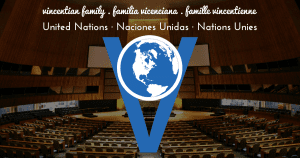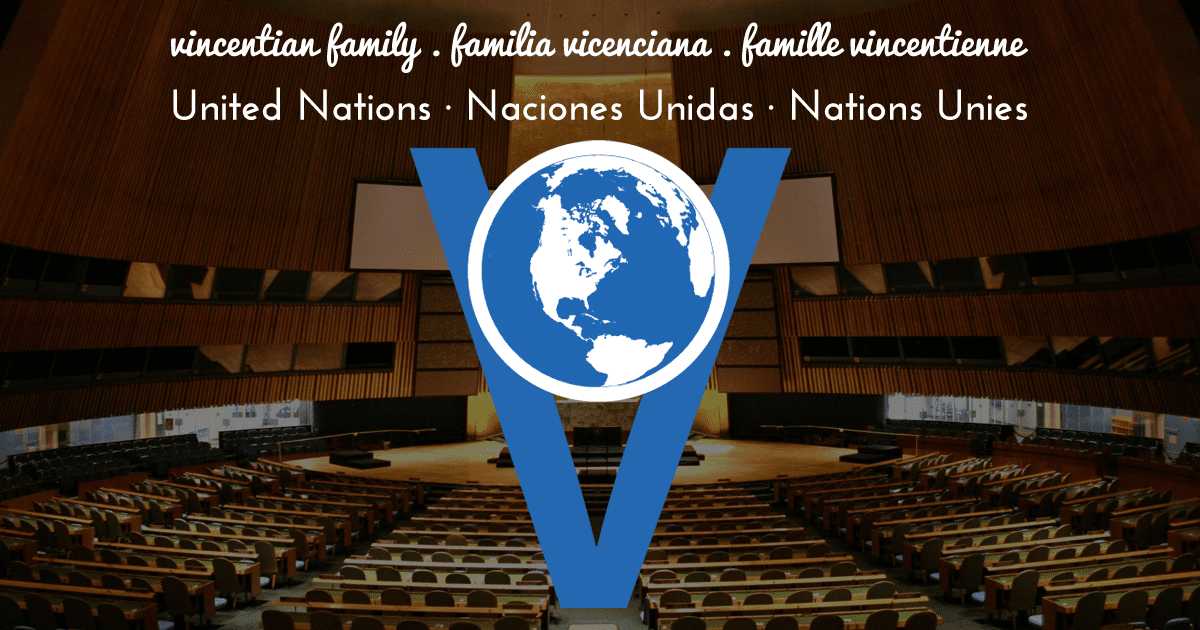Children on the Move

Merry Christmas from your UN NGO’s
Unforeseen circumstances uproot couple. They take shelter in a manger for lack of better accommodations. The birth of their child instills hope and joy in many, but fear of a murderous leader causes them to escape to another country. When repatriated, the family is internally displaced due to fear of government leadership in their home district.
It is very timely that last Monday (December 18) was International Migrants Day, especially because vulnerable circumstances surrounding Jesus’ birth and early days are very prominent in our minds as Christmas nears. Like the Christ child, many of today’s children are refugees or migrants, experiencing not only displacement, but also lack of resources, inadequate housing, poverty, danger, and more. Half the population of refugees and migrants are children.
Imagine the impact on a child when a parent leaves to seek a better life in another location. Or the effects of making a dangerous journey through unknown territory with parents. Further still, making the journey as a child alone. Migratory routes can be frightening. Children can be subject to abuse, trafficking, and exploitation while en route, as well as exclusion, discrimination, and poverty when they reach their destination. Sometimes, they don’t have access to identification, which make it challenging to arrange education or social services.
One might ask, “who’s minding children on the move?”
AT THE UN LEVEL, UNICEF SIGNIFICANT IN ADDRESSING CHILDRENS’ ISSUES
Many non-governmental organizations address immediate needs of refugee and migrant children. Although various entities address children’s issues at the UN level, perhaps the most significant is the United Nations Children’s Fund (UNICEF), which works in 190 countries and territories.
UNICEF CAMPAIGNS
When a crisis occurs, UNICEF takes steps to reach children and families in the hardest hit areas with needed resources. It is also has engaged in a variety of child protection campaigns, such as #AChildIsAChilld, which highlights the effects war has on children; the Coalition on Every Child’s Right to Acquire a Nationality; #ENDviolence (against children); #ChildrenUprooted; #ActofHumanity (2016), which addressed xenophobia and discrimination; an effort to promote mental health and psychosocial support in emergencies, and more.
UNICEF RESPONSE TO CURRENT CRISES
The current crisis in Sudan has displaced about 1.9 million children and prevented many from receiving needed services. UNICEF’s Regional Office is helping to coordinate ongoing initiatives in the country offices. In terms of Syrian refugees, as well as other affected populations in Egypt, Iraq, Jordan, Lebanon, and Turkey, UNICEF and partners planned to reach 2.72 million people with the provision of sustainable water; 881,713 children with education; and 325,667 children with access to structured, sustained child protection or psychosocial support.
About 16,000 children from Guatemala, Honduras, and El Salvador were apprehended in Mexico in the first six months of 2016. UNICEF is working to address the causes with Central American and Mexican governments. UNICEF is trying to strengthen services that reduce the vulnerability of children to violence, crime and other threats, and supports programs for education and health, with special focus on the most affected and vulnerable communities.
NUMBERS OF CHILDREN WHO ARE MIGRANTS OR REFUGEES
According to UNICEF, about 50 million children are on the move. Conflict, UNICEF tells us, has uprooted about 28 million children. Many families have turned to smugglers, traffickers, and perilous routes that endanger children’s safety. In example, 400 children died this year while attempting to cross the Central Mediterranean from Libya to Italy.
UNICEF’S APPROACH
UNICEF’s approach is to examine issues from a cross-cutting perspective. In example, a migrant child with learning disabilities has great educational needs, in addition to those of safety, food, water, and shelter. You can’t consider the needs of children on the move without examining what causes families to flee their homes.
UNICEF’S INITIATIVES
In addition to on-the-ground support through resources and various initiatives that address basic needs, UNICEF engages in awareness-raising campaigns; the promotion of child protection systems which interweave health, education, social welfare, and security; advocacy for policy change; encouragement of dialogues; work to change social norms; research, and more.
GLOBAL COMPACT FOR MIGRATION
The Global Compact for Migration is expected to be finalized and approved during the UN’s General Assembly in September. Input to date was reviewed during a stock-take meeting in Puerto Vallarta, Mexico, in early December. One of many stakeholders’ meetings on the Compact was held in New York last Monday. A second compact related to refugees also is currently being negotiated.
UNICEF indicates that protection, safety, and well-being of children must be a key component of the Global Compact. It is encouraging nations to take measures which are in accordance with the New York Declaration on Refugees and Migrants and the Convention on the Rights of the Child.
UNICEF REPORT RELATED TO GLOBAL COMPACTS ON MIGRATION AND REFUGEES
“Beyond Borders: How to make the global compacts on migration and refugees work for uprooted children,” can be found by clicking here.
UNICEF advocates for a six-point plan to keep refugee and migrant children safe:
- Protect child refugees and migrants, particularly unaccompanied children, from exploitation and violence;
- End the detention of children seeking refugee status or migrating, by introducing a range of practical alternatives;
- Keep families together as the best way to protect children and give children legal status;
- Keep all refugee and migrant children learning and give them access to health and other quality services;
- Press for action on the underlying causes of large scale movements of refugees and migrants;
- Promote measures to combat xenophobia, discrimination and marginalization in countries of transit and destination.
As we rejoice and marvel at the birth of the Christ Child on Monday, let’s do our part to make the world safe and welcoming for all children, especially those on the move!
JOIN CARITAS TO “SHARE THE JOURNEY”
Join hands with Caritas and Pope Francis to reach out around the world in support of migrants everywhere. Show your support and understanding of migration’s challenges with a “Reach Out” photo. Simply reach or stretch out your arms, snap a pic, and post it on social media with the #sharejourney hashtag. Find out more by clicking here.
HAVE SOME INPUT ON YOUTH AND HUMAN RIGHTS
The UN Office of the High Commissioner (OHCHR) is looking for input on youth and human rights. They would like to hear from you (anyone around the world) about the following:
- challenges faced by young people in your country
- best practices, policies and programs
- contributions of youth organizations
- measures to support the realization of young people’s rights
Information should be sent to Imma Guerras-Delgado, Office of the United Nations High Commissioner for Human Rights (e-mail: registry@ohchr.org, cc: iguerras-delgado@ohchr.org) by January 12, 2018 at the latest. The information provided will be made available on the OHCHR website.
Here’s the link for more information: http://www.ohchr.org/EN/Issues/Youth/Pages/CallInputsYouth.aspx








0 Comments